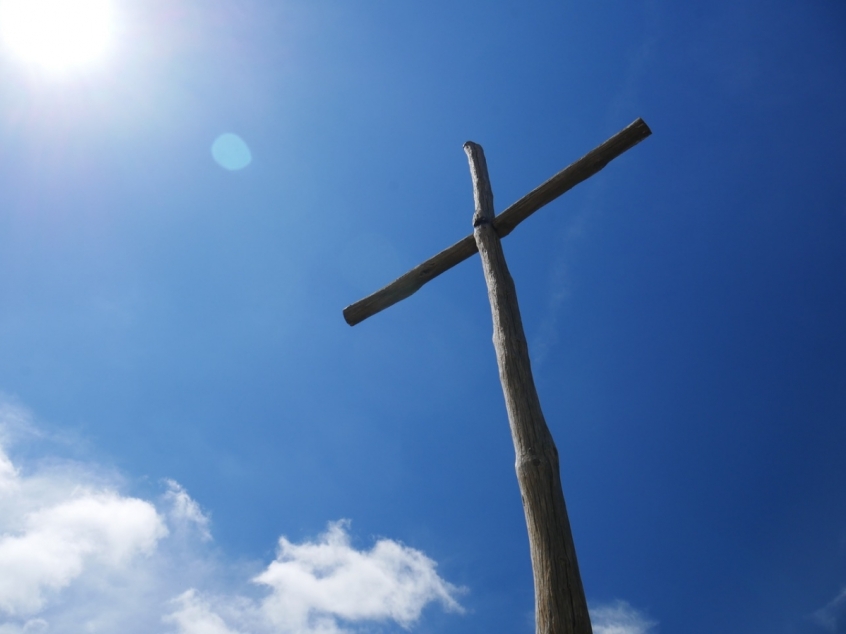What would you regard as the biggest scandal at the moment?
We've certainly had a lot of them over the past 12 months. When we think of the word 'scandal' we probably think of news stories in the US involving Harvey Weinstein and Robert Mueller and Donald Trump. In the UK, the names of various recently-resigned cabinet ministers might come to mind. We might also think of avoidable disasters, such as the Grenfell Tower fire in London, the gap between rich and poor, or environmental issues.

But it's probable that the crucifixion of Jesus Christ might not be among those things we recall. Yet traditionally, Christians have spoken of the 'scandal' of the cross. It's a perspective we need to recover as we head into 2018.
As we continue our fortnightly pilgrimage through Mark's gospel we come to a section where Pilate, the governor of the Roman province of Judaea, seeks to fulfil a local custom whereby a single prisoner could be released as an act of goodwill every year at Passover.
On this particular occasion, Jesus is in custody, having been handed over to Pilate by the local religious leaders. Also in gaol was 'a man called Barabbas who was in prison with the rebels who had committed murder during the insurrection' (Mark 15:7) – probably one of the many ongoing acts of resistance to the occupying Roman forces.
So Pilate asks the crowd who have gathered who it is they would like to see released, and asks if they wish Jesus to be freed. However some of the religious leaders 'stirred up the crowd to have him release Barabbas for them instead' – and so Barabbas is freed, while Jesus is sent for crucifixion. And this brings us to the 'scandal' of the cross. Here's why:
1. A guilty man is freed. It was Barabbas who deserved execution (if anyone did) for his insurrection. And yet he is the one who is released.
2. An innocent man is executed. Jesus is sent to be tortured and put to death even though, as Pilate says, 'What evil has he done?' The answer, of course, is none whatsoever.
3. This points us to the heart of the message of the cross. As former Bishop of Durham Tom Wright puts it: 'The story of Barabbas invites us to see Jesus' crucifixion in terms of a stark personal exchange. Barabbas deserves to die; Jesus dies instead, and he goes free.' And the same is true for us. It is our sin that carries a death penalty; but it is Christ who receives the sentence.
Famous Christian apologist Ravi Zacharias writes about the 'scandal of the cross' that 'this was the path Jesus chose with which to reach out for you and for me. You see, this thing we call sin, but which we so tragically minimize, breaks the grandeur for which we were created. It brings indignity to our essence and pain to our existence. It separates us from God.' He continues: 'On the way to the cross two thousand years ago, Jesus took the ultimate indignity and the ultimate pain to bring us back to the dignity of a relationship with God and the healing of our souls. Will you remember that this was done for you and receive his gift?'
And pastor and author Mark D Roberts declares: 'Why do we Christians need to recover a sense of the scandal of the cross? For one thing, it helps us realise the depths to which God is willing to stoop in order to save us. This leads us to wonder, gratitude, and humble worship. Moreover, it is only when we grasp the true meaning of the cross – including its scandal – that we'll be ready to communicate the full gospel of God to people who do not yet believe.'
So the next time you hear the word 'scandal' as we head into 2018 let us by all means acknowledge the seriousness and injustice of whatever it is that is reported.
But let us also remember the scandal of Jesus – God made man, and an innocent man – crucified for you, and for me. As the song puts it:
My Lord, what love is this,
That pays so dearly
That I, the guilty one, may go free?
Amazing love, O what sacrifice –
The Son of God given for me!
My debt he pays, and my death he dies
That I might live.
Think about it.
David Baker is a former daily newspaper journalist now working as an Anglican minister in Sussex, England. Find him on Twitter @Baker_David_A
The Rough Guide to Discipleship is a fortnightly series.













